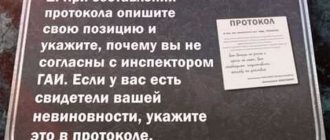Cases of mandatory submission of explanations
Article 26.3 of the Code of Administrative Offenses of the Russian Federation provides for cases of mandatory submission of explanations in a case of an administrative offense.
Thus, a medical/pharmaceutical organization in respect of which proceedings are being conducted in a case of an administrative offense, provide explanations included in the protocol on the administrative offense, in the protocol on ensuring measures and the protocol on consideration of the case.
https://www.youtube.com/watch?v=https:accounts.google.comServiceLogin
Typically, such explanations are given during the very initiation or consideration of a case - when the organization (its representative) does not have the opportunity to thoroughly consider certain circumstances relevant to the case. Accordingly, such explanations can be used both in favor of the organization and against it.
Please note that at the stage of considering a case of an administrative offense, hearing explanations given by the organization is also a mandatory procedure (Part 2 of Article 29.7 of the Code of Administrative Offenses of the Russian Federation).
However, in this article we would like to talk about explanations in a case of an administrative offense that can be presented by an organization independently, on its own initiative, not because it is required by law.
As is known, in administrative proceedings there is a presumption of innocence of the person against whom proceedings for an administrative offense are being conducted: this means that if a case for an administrative offense is initiated against an organization, it is considered innocent until its guilt will be proven in the manner prescribed by the Code of Administrative Offenses of the Russian Federation, and established by a decision of the judge, body, or official who considered the case that has entered into legal force.
At the same time, the organization in respect of which proceedings are being conducted in a case of an administrative offense, like no one else, is interested in proving its innocence and can use for this the mechanism of presenting explanations in a case of an administrative offense if it does not agree with the protocol issued against it. administrative offense.
Such explanations are prepared by the organization as a separate document and presented to the person considering the case (a judge or an official of a supervisory authority) in order to influence its outcome.
General recommendations for filing a complaint against unlawful actions of traffic police officers
When making a complaint, it is important to consider the following key principles:
- The complaint must indicate the articles of codes or other legislative acts on the basis of which the application is being submitted.
- The circumstances of the case must be presented as objectively as possible.
- It is necessary to provide the maximum amount of evidence, the burden of collecting which falls on the complainant.
Is it possible to appeal the revocation of a driver's license?
Read how to appeal a traffic police fine from a camera here.
Read about fines for illegal parking at the following link:
What does an objection to a protocol on an administrative offense look like?
The reason is usually the discovery of signs of an offense at the scene of its commission, statements of any persons, messages from law enforcement agencies, the media, video recording.
The case is considered initiated from the moment the protocol, ruling (if an investigation is required) or resolution is prepared.
When a violation of traffic rules causes harm to life or health, an inspection of the site of the administrative offense is mandatory. The protocol is drawn up immediately.
The Code of Administrative Offenses of the Russian Federation also provides that punishment can be imposed without drawing up a document recording the offense. When a warning or fine is applied, a resolution is immediately drawn up.
In difficult situations (antitrust, insurance, patent, etc. legislation), an administrative investigation may be ordered. The period is 1 month, it can be extended. Upon completion, a protocol on the identification of violations is drawn up or the proceedings are terminated.
Further, the consideration of the case of an administrative offense is carried out in accordance with the general procedure.
- Protocol on administrative violation. FSSP sample. (Appendix No. 134 to Order of the Federal Bailiff Service of Russia dated July 11, 2012 No. 318)
- Sample protocol on an administrative offense in the field of traffic in Moscow (Appendix 5 to the Order of the Department of Transport and Development of Road Transport Infrastructure of the City of Moscow dated May 12, 2011 N 61-02-63/1)
- Protocol on administrative violation. FAS sample (Appendix No. 6 to the Regulations for the preparation and conduct of cases of administrative offenses in the central office of the FAS Russia)
- Protocol on an administrative offense (violation of electoral rights) (Appendix 2 to the Recommendations on certain issues of application of the Code of the Russian Federation on Administrative Offenses by election commissions)
- Protocol on administrative offenses in the field of road traffic (Appendix No. 6 to the Administrative Regulations of the Ministry of Internal Affairs of the Russian Federation for the execution of the state function of control and supervision of compliance by road users with requirements in the field of ensuring road safety)
- Protocol on administrative violation. Rostekhnadzor sample (Appendix No. 1 to Order of the Federal Service for Environmental, Technological and Nuclear Supervision dated September 26, 2014 No. 442)
- Protocol on administrative violation. Sample of the Moscow Municipal Internal Affairs Directorate (Appendix No. 1 to the Order of the Moscow Municipal Internal Affairs Directorate of April 28, 2006 No. 261)
- Determination to initiate a case of an administrative offense and conduct an administrative investigation (Appendix No. 16 to the Administrative Regulations of the Ministry of Internal Affairs of the Russian Federation for the execution of the state function of control and supervision of compliance by road users with requirements in the field of ensuring road safety)
- Determination of refusal to initiate a case of an administrative offense (Appendix No. 17 to the Administrative Regulations of the Ministry of Internal Affairs of the Russian Federation for the execution of the state function of control and supervision of compliance by road users with requirements in the field of ensuring road safety)
Alexander Otrokhov, Legal, 04/15/2015
The protocol contains information about the persons who committed the offense and sets out in detail the circumstances of the violation. It is impossible to appeal this procedural document, but the law allows you to file an objection to it in cases where inaccuracies or contradictions with the norms of substantive and procedural law are found in it.
Making a complaint
https://www.youtube.com/watch?v=ytcopyright
If the plaintiff in the case has made demands, then the defendant or interested parties have the right, in accordance with paragraph 2 of Art. 2 135 of the Code of Administrative Proceedings (CAS RF) to file your objection to them.
We invite you to familiarize yourself with: Sample complaint to the FAS about the actions of the customer - sample under 44-FZ in 2021
In the event that an official accepts the plaintiff’s arguments in some part or in full, he can draw up his own review.
If an illegal action has been committed against a person or an inaction has been committed, then in order to protect his legal rights he can file a complaint in an administrative case to an authorized authority.
The legislation provides for general and special administrative complaints. A general complaint is submitted by any citizen to an authorized body or a higher official. The special one is distinguished by the procedure for filing, registration and subsequent consideration provided for in the relevant norms and rules of the current legislation.
If an administrative offense has been committed, a protocol is first drawn up against the offender, which will become the basis for initiating a process and issuing an appropriate resolution.
The current legislation gives the opportunity to a citizen against whom a penalty has been imposed to make his own comment on the protocol. It is not easy to do this on your own, since it will not be enough to list the points with which the interested person disagrees, but you must indicate exactly why these provisions of the protocol violate his rights and interests, and the norms of the law.
Drawing up a protocol
An objection to the protocol is drawn up in the following cases:
- Violations of procedural issues. If, for example, a police officer, despite the request of the party, did not interrogate and identify witnesses to the incident. This would be a serious violation of procedural rules, which could lead to an incorrect decision in the case.
- Material misrepresentation of factual events. This refers to an incorrectly specified place or time, as well as to the presentation of circumstances that did not actually occur.
Note! A record refers to a formal document drawn up by an official in the performance of his duties. That is why there cannot be unverified or incorrect facts in it.
If even a simple mistake was made when drawing up this document, this could lead to either the imposition of an unjustified punishment, or to the unlawful termination of the case and the non-application of preventive measures against the offender. That is why before signing you need to carefully and even several times study this document. After discovering inaccurate or unreliable data, you must immediately, without delaying time, draw up and submit a formal objection.
We must always remember that if false data is discovered, there is a high probability that the subsequently imposed penalty will be canceled in court.
Sample complaint
The protocol, in addition to information about the incident itself, may include various diagrams, data from examinations performed, or other arguments. For example, a person accused of committing a traffic violation may question the completeness, reliability and correctness of this information. For example, after an accident, a medical examination of the victim was carried out, which established that he had a mild injury.
Note! The law does not establish specific deadlines for an individual to submit comments on the protocol. But, based on the meaning of the norms of the CAS of the Russian Federation, it is possible to appeal the entries in the protocol within the two-month period that is generally allocated for the consideration of an administrative case.
The objection is drawn up in any form, but the generally accepted structure is followed, including:
- information about the judge, administrative body or official hearing the case;
- the main violations that were committed by the official when drawing up this document;
- a request to the body or official considering the objection;
- applications confirming the arguments of the individual who filed the objection;
- date of compilation and signature.
The "header" indicates
To the Rospotrebnadzor department
in the Moscow region
from IP Ivankova A.A.
Objections
on the protocol on administrative offense No. of 2018
On June 1, 2021, a management specialist (full name of the official) drew up administrative protocol No. against me for the sale of goods of inadequate quality under Article 14.4 of the Code of Administrative Offenses of the Russian Federation.
My last name was incorrectly indicated in the protocol (Ivanova, instead of Ivankov). In addition, no one confiscated any goods from me for quality control. The protocol stated that I refused to give any explanations, but in fact no one asked me for any explanations, which the witnesses nearby (my seller and the loader) could confirm. The protocol did not reflect that the official who compiled it explained to me the provisions provided for in Art. 25.1 Code of Administrative Offenses of the Russian Federation procedural rights.
I ask you to take into account these circumstances when considering the administrative case initiated against me.
07/05/2018
Ivankova A.A.: (signature)
Objections are sent to the appropriate official, to whom the official who compiled the protocol reports, by registered mail with return receipt requested, or sent in person to the reception or office of this organization. The second copy is kept for yourself.
According to Part 1 of Article 26.3 of the Code of Administrative Offenses of the Russian Federation, the explanations of a person against whom proceedings are being conducted for an administrative offense constitute information relevant to the case and communicated orally or in writing.
In accordance with Article 26.2 of the Code of Administrative Offenses of the Russian Federation, explanations in a case of an administrative offense act as evidence in a case of an administrative offense and can play both a positive and negative role in the decision-making process in the case.
Unlawful actions of traffic police officers
Unlawful actions are actions or inactions on the part of police officers or other officials serving in the traffic police, which directly or indirectly violate the standards of the current Russian legislation, or the official charter adopted by the traffic police department.
If the car owner intends to file a complaint in the future against the actions/inactions of a traffic police officer, then he must clearly understand what rights he has and what he is obliged to do when stopping a vehicle at the request of an authorized officer. The car owner's procedure is as follows.
- A complete stop of the vehicle by turning off the engine and removing the keys from the ignition.
- It is necessary to open the car window so that you can freely show the employee your driver’s license.
- It is advisable to get out of the car only at the request or demand of a traffic police officer. This can happen in the following cases: suspicion against the driver or passenger of committing an act that may be classified as a crime; suspicion that the driver is under the influence of alcohol or drugs; presence of a vehicle malfunction; the need to check the cargo; providing assistance to other road users. The latter, as a rule, is expressed exclusively as a request and calls for civil liability, but not as an instruction for mandatory execution.
How to avoid punishment for refusing a medical examination.
Find out how to appeal a parking fine here.
Where to go if you disagree with traffic police fines, read the link:
A traffic police officer has the authority to stop a vehicle only in the following cases (other reasons for stopping can be considered illegal).
- For routine verification of document compliance at specialized traffic police points (checkpoints, etc.).
- Committing offenses specified in the Traffic Regulations and the Code of Administrative Offences.
- Availability of information that the driver or his passengers may be involved in an act that is classified as a crime or offense.
- The presence of official information that this vehicle is contained in the database of wanted vehicles or there is a suspicion that this vehicle is involved in a particular illegal act.
- Availability of information that the driver or passenger is a witness to the unlawful act committed.
- Instructions from government agencies or authorized officials to conduct an inspection of documents or cargo transported by vehicles.
- In order to attract drivers and/or passengers to participate in providing assistance to third parties or police officers.
Important! In the absence of these grounds, it makes sense to talk about such a phenomenon as abuse on the part of an official in charge, which serves as the basis for subsequently drawing up a corresponding statement.
Protocol - what kind of document?
The concept of this document is enshrined in the Code of Administrative Offenses of the Russian Federation. To put it in your own words, a protocol is an official document drawn up by an authorized official, containing information about the essence of the administrative offense. The specified document must indicate the circumstances of its commission, information about the culprit, witnesses, victims, and a specific article of the law regulating liability for the violation.
In everyday life, many people who do not have a specialized legal education often say: “appealing the protocol.” This statement is, of course, incorrect from the point of view of the law, since only a decision made based on the results of an examination of the evidence in the case, including the above-mentioned document, can be challenged.
The protocol serves only the role of recording the circumstances of a specific offense. That is why it is impossible to challenge the presence/absence of source data. In this case, the culprit has the right to file appropriate objections regarding the information contained therein. We’ll talk about how to do this further and consider a sample objection to a protocol on an administrative violation.
What to do if you don't agree?
Appeal to the traffic police or go to the district court.
In practice it looks like this.
- On the road, a traffic police officer stops you and charges you with an offense, which you categorically disagree with (no matter the event or the punishment).
- Notify the inspector that you disagree with his decision (before issuing a resolution).
- Wait for the traffic police inspector to fill out the decision form. Read the document carefully and sign.
- The inspector will draw up a protocol on the administrative violation. You also need to read it and then fill out the “Explanations and Notes” field. Please indicate that you do not agree with the violation charged to you. If possible, with details, facts, links to articles.
- Get a copy of the decision from the inspector.
- Next, be sure to submit a complaint to the traffic police department or to the court within 10 days: in person or by registered mail by mail (Clause 1 of Article 30.3 of the Code of Administrative Offenses of the Russian Federation). Of course, with evidence in favor of your innocence or procedural violations on the part of the traffic inspector. For your convenience, the resolution will in any case contain a memo with instructions and coordinates of the State Traffic Inspectorate.
You have a slightly better chance if you go directly to the district court. Especially if you have collected significant evidence or attracted a lawyer. This will increase the chances of successfully appealing the decision. But you shouldn’t have any illusions either. Courts often side with traffic police inspectors. And they formulate this by saying that they have no reason not to trust government officials.
Deadlines
In these cases, the issue of time is very important.
Thus, a protocol must be drawn up immediately at the scene of the offense. If collection of missing information is required, this process can be delayed for up to 2 days.
If the protocol is drawn up in your absence, subject to proper notice, a copy must be sent to you within 3 days.
The total period for consideration of a case is 15 days, in court - 2 months, with the exception of certain categories of cases (for example, in the field of electoral law).
We invite you to read: Administrative responsibility of local government deputies
Structure
So, objections to the protocol and a complaint against a decision on an administrative offense must be structured competently and logically. The text of these documents usually contains the following components:
- header: indication of the body/official to whom the paper is addressed; Full name and contact details of the person submitting it;
- main part: a link to the appealed document with its details, briefly the circumstances of the case, the essence of the offense, reasons for disagreement and arguments based on the law;
- pleading part: clear requirements in accordance with legal norms;
- attachment: additional documents (if necessary).
This does not mean that your document must strictly follow the above structure. Let’s say that objections to the protocol often lack a clear pleading part, since the general point of view of the guilty person is described.
A competent example of objections to a protocol on an administrative offense is given below.
Filing a complaint to the courts
The procedure for challenging a decision on an administrative violation should be considered from several angles. Namely:
- When an appeal is made against the legality of the actions of a traffic police officer;
- A situation where a motorist does not agree with a previous court ruling.
In the first situation, the application for appeal is sent to the place where the act was committed. After receiving the summons, the driver learns the date on which he must come to the meeting for further consideration of the case.
A citizen should have irrefutable evidence with him that will fully confirm the illegality of the imposed administrative liability.
In the second situation, the driver already has a court order, and he is appealing against it. If the decision was made by the magistrate, the protest is sent to the district authority. If the decision was made by the last court, an appeal is made through the regional institution. The decision made can be appealed only once.
If the accusation is illegal and completely unfounded, and the motorist has real evidence that he is right, it is possible to get the decision overturned. You should not despair, but in case of illegal actions of a traffic police officer, contact higher authorities and try to prove your position.
Pre-trial appeal
Some people think that it is better to go straight to court with their demands. But is this really so?
The Themis Institute, of course, is the latest and most important authority. However, we should not forget about the possibility of a peaceful pre-trial appeal.
In many cases, when officials issue a protocol on an offense, this means that further out-of-court proceedings are pending in the appropriate authority. In this case, you will be assigned a time and place for the hearing of the case, where you must arrive and defend your point of view.
For reliability, you can make an audio recording of the proceedings, but before that you need to make an announcement that a recording is being made and indicate information about the equipment. Only in this case can the file be used as evidence in court.
If the above methods did not help you defend your rights, and the decision of the relevant authority was not made in your favor, then it makes sense to go to court.
Appealing a decision: how, where, when
We've sorted out the protocol, now let's move directly to the appeal.
If you do not agree with the amount of the fine, which can be issued at both the lower and upper limits, then you should contact an official from the IAZ group (enforcement of administrative legislation).
Also on the topic: How to save money on purchasing compulsory motor insurance?
If you do not agree with the actions of the traffic inspector, then according to the established procedure it can be done in 2 ways:
- Initially, write a complaint to higher management (this can be either the head of the traffic police department or the commander of this traffic police unit), and then, if this does not help, go to court.
- Contact the court directly.
In this case, your application must be drawn up by hand, in the appropriate manner (see sample appeal), contain your signature, and also be:
- Brief. No one is interested in reading 20-page novels, and besides, the risk that the reader will not pay attention to the points that are important to you is extremely high.
- Structured. The complaint can be written in any style (preferably businesslike), but must have a consistent logical sequence: Who is filing the complaint, what he is accused of, what and on what basis he does not agree, what he is asking for (cancel the decision/mitigate) and what I am ready to provide materials as proof of my innocence.
- Reasonable. The more legislative documents, excerpts from the Code of Administrative Offenses of the Russian Federation, etc. you can cite in your defense, the higher the likelihood that your complaint will be satisfied.
Pre-trial appeal
There are cases in which a decision is made only by this body (for which a sanction is possible in the form of deprivation of a driver’s license, suspension of activity, administrative arrest, etc.).
Based on the results, the judge imposes a punishment or terminates the case due to exceptional circumstances.
For other categories of cases, final acts are authorized to be drawn up by bodies that identify these offenses (OVD, prosecutor's office, Rospotrebnadzor, tax inspectorates, customs authorities, FAS authorities, etc.) In such cases, the court considers complaints against these decisions as a second instance.
The Code of Administrative Offenses of the Russian Federation provides that the total appeal period is 10 days. If it is missed, you can apply for reinstatement in court.
The complaint is submitted to the body that issued the decision. It is he who is obliged to send it within 3 days to a higher authority.
Important note: you do not need to pay a state fee.
Based on the results of consideration of the complaint, the court makes a decision, which can also be challenged in a higher authority in the same manner.
Where to file a complaint about unlawful actions of traffic police officers
In deciding how to restore justice within the framework of the topic under consideration, they turn to two main authorities.
- UGIBDD. In this case, the application is drawn up in the name of the law enforcement officer who committed unlawful actions or inactions. He, in turn, is obliged to forward the complaint to higher authorities. Or a complaint about unlawful actions of traffic police officers is written to the head of the State Traffic Safety Inspectorate - this option is faster and more reliable. The complaint is sent by mail or submitted in person. When sending by mail, it is important to order the shipment with notification. When submitting in person, you must obtain a receipt from the addressee.
- Court. A complaint can be filed with the court immediately or if it is impossible to resolve the conflict pre-trial.
Exceptional circumstances
If one of the following initial data is present, then the case is not initiated, and the one started must be terminated at any stage:
- there is no event (for example, there was no actual accident, but the car was damaged as a result of a falling stone);
- there is no composition (there is no object/subject/objective/subjective side of the violation: the person is under 16 years of age);
- emergency situation (the accident was committed to prevent a collision with a pedestrian);
- act of amnesty on release from punishment;
- termination of the law regulating liability for violation;
- the statute of limitations has expired;
- if there is already an act issued on the fact of the violation or a criminal case has been initiated;
- death of the culprit individual/bankruptcy of a legal entity;
- others.
https://www.youtube.com/watch?v=ytabout
I would like to note that the investigation of these cases is a difficult and time-consuming procedure. Whatever sample objection to a protocol on an administrative offense you find on the Internet, it is clear that it needs to be reworked to suit the specific circumstances of your case. If difficulties arise, it is always better to seek help from a professional lawyer.











